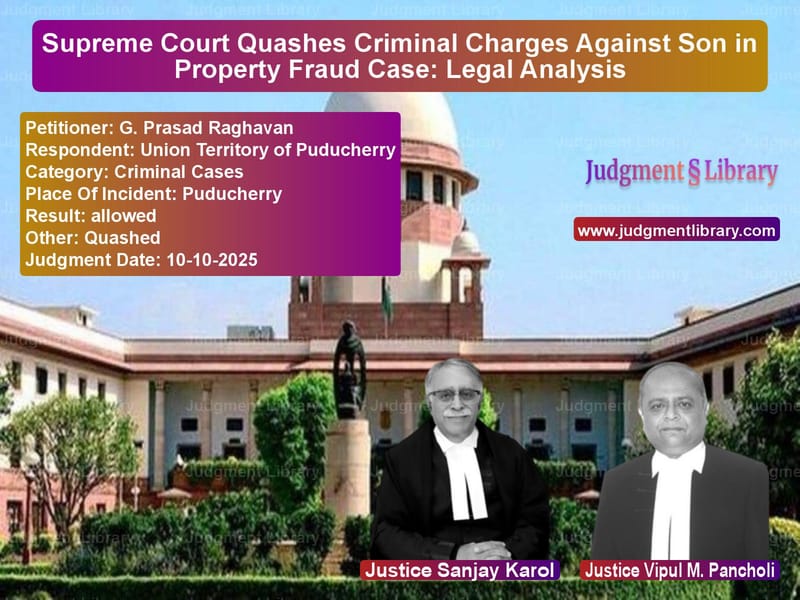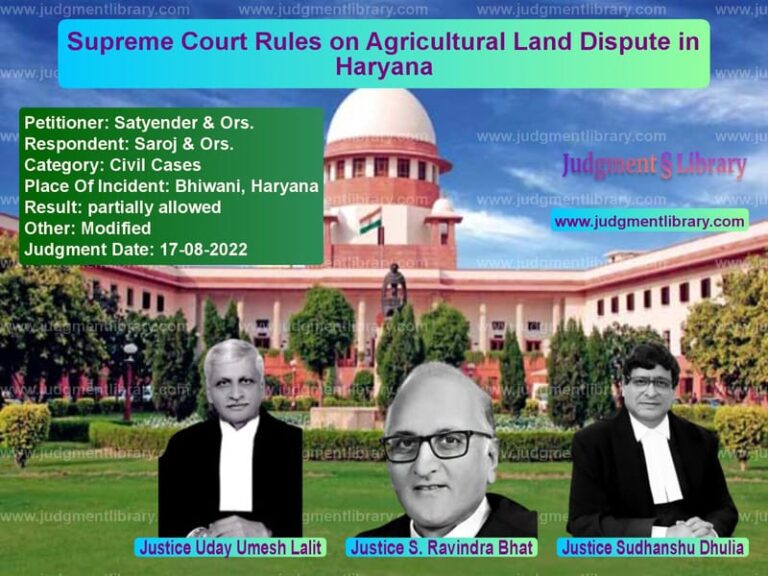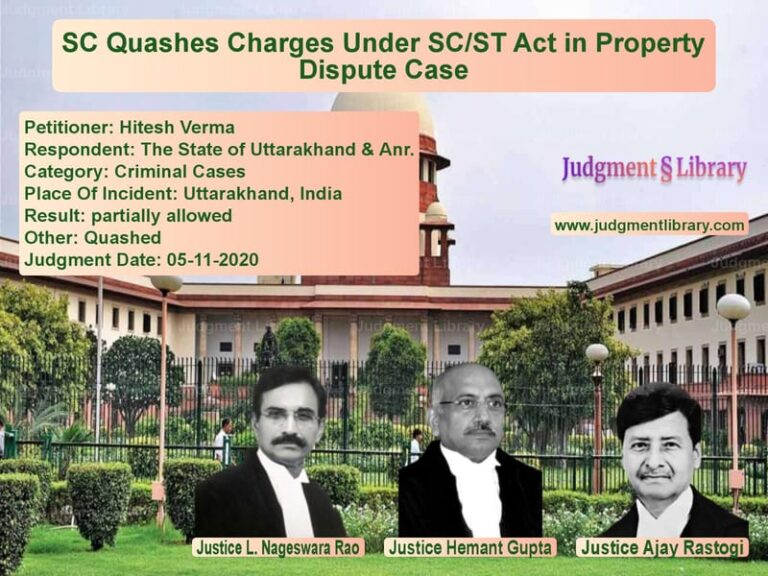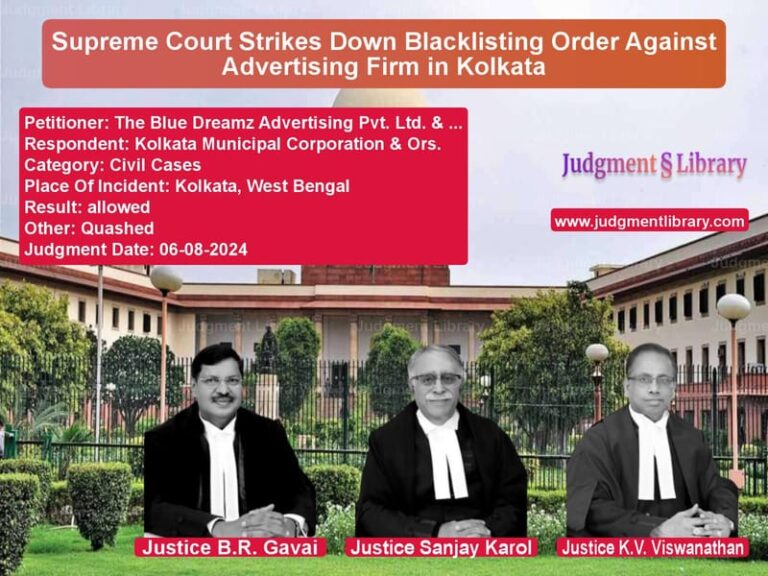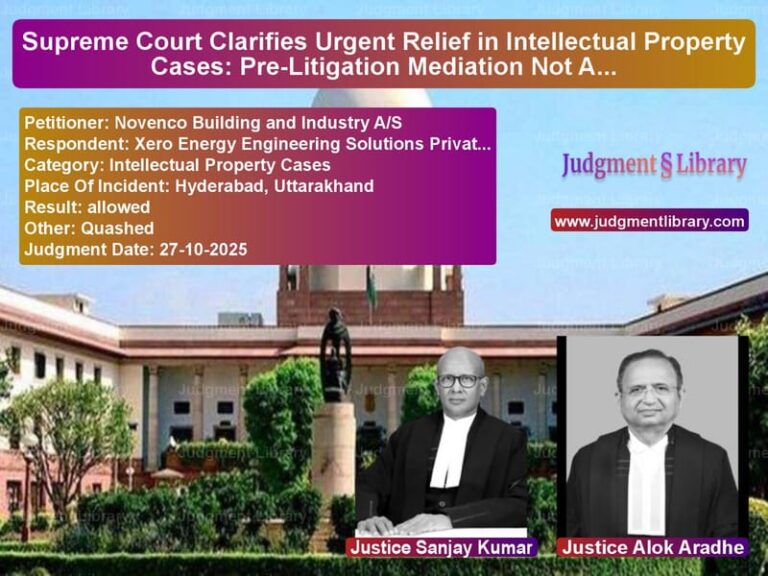Supreme Court Quashes Criminal Charges Against Son in Property Fraud Case: Legal Analysis
In a significant criminal law judgment, the Supreme Court of India recently delivered a ruling that clarifies the legal requirements for establishing criminal liability in property fraud cases. The case involved G. Prasad Raghavan, who faced serious criminal charges merely for purchasing a property from his father, who was accused of cheating in a previous property transaction. The Court’s decision highlights the importance of establishing specific ingredients for criminal offenses and protects individuals from being unfairly implicated in criminal proceedings where no direct involvement or criminal intent is demonstrated.
The Background of the Case
The legal dispute originated from an FIR filed by Ms. Amutha against Gunasekaran (original accused no. 1) for allegedly committing offenses under Section 420 of the Indian Penal Code (cheating). According to the complaint, Gunasekaran had represented that he owned a vacant plot and wanted to sell it. After inspection, the informant decided to purchase the property, and an unregistered sale agreement was executed on May 13, 2015, for a total consideration of Rs. 1,64,10,000. The informant paid Rs. 15,00,000 in cash initially, followed by Rs. 55,00,000 on February 17, 2016, with two additional cheques of Rs. 10,00,000 each. Later, it was discovered that Gunasekaran did not have valid title to the property, and despite receiving approximately Rs. 92,00,000, he refused to execute the sale deed in favor of the informant.
After investigation, the police filed a chargesheet not only against Gunasekaran but also against his son, G. Prasad Raghavan (the appellant), for offenses under Sections 420, 406, 294(b), 506(i) read with Section 34 of IPC. The allegation against the appellant was that Gunasekaran had obtained a power of attorney from the original owners on March 3, 2022, and executed a sale deed in favor of his son for Rs. 60,00,000. The prosecution alleged that the appellant, being a student with no independent income, had registered the property in his name despite knowing that his father had not returned the sale consideration received from the original informant.
The Legal Journey Through Lower Courts
The appellant, along with his father, filed a discharge application under Section 239 of the Code of Criminal Procedure before the Chief Judicial Magistrate in Puducherry. The Magistrate dismissed their application on March 15, 2024. Subsequently, they filed a criminal revision application before the Madras High Court, which was also dismissed through the impugned order dated April 15, 2025. It was against this backdrop that the appellant approached the Supreme Court through a special leave petition.
Arguments Presented Before the Supreme Court
The appellant’s senior counsel presented compelling arguments highlighting the absence of any criminal liability on the part of his client. “The transaction in question took place in the year 2015 between original accused No. 1 and the informant. Even as per the case of the informant, the original accused no. 1 made a representation with regard to the plot in question and thereafter as alleged by the informant, the particular amount was given by him to the original accused no. 1. At the relevant point of time i.e. in the year 2015, the present appellant was a minor. Thus, no representation was made by the present appellant to the informant nor any inducement was given by the present appellant. The appellant is nowhere connected with the transaction in question at the relevant point of time.”
The counsel further argued that “merely because the present appellant has purchased the plot in the year 2022 from accused no. 1, it cannot be inferred that the appellant has committed the alleged offences.” He contended that both the trial court and High Court had erred in not allowing the discharge application concerning the appellant.
On the opposing side, the respondent’s counsel defended the imposition of criminal charges against the appellant. “The original accused no. 1 who is the father of the present appellant has sold the plot in question to the present appellant in the year 2022. When the property was sold to the present appellant, the appellant was major and in fact the appellant was a student at the relevant point of time, despite which he paid the amount of consideration to the original accused no. 1.” The respondent maintained that the High Court had correctly observed that “after considering the entire material and the allegation in the chargesheet and the statement of the witnesses, prima facie material to proceed with the case against both the accused are made out and therefore the Court cannot conduct a roving enquiry to testify the veracity of the documents while deciding the petition under Section 239 of the Code of Criminal Procedure.”
The Supreme Court’s Analysis and Reasoning
The Supreme Court bench comprising Justices Sanjay Karol and Vipul M. Pancholi conducted a thorough examination of the facts and legal principles involved. The Court noted several crucial aspects that fundamentally undermined the prosecution’s case against the appellant.
The Court observed that “the informant has filed the FIR under Section 420 of IPC against the original accused No. 1 only. If the allegations levelled in the said FIR is carefully examined, it would reveal that the transaction between the informant and the accused no. 1 took place in the year 2015. The allegation of making representation as well as endorsement was made against the accused no.1. Further, the payment was made to the accused no.1 in the year 2015-2016. It is not in dispute that in the year 2015-2016, the appellant herein was minor.”
This temporal distinction proved crucial to the Court’s analysis. The Court emphasized that “It is not the case of the informant that the appellant herein has made any representation or there was any inducement on the part of the present appellant. It is not even the case of the informant that he had made the payment to the present appellant for the transaction with regard to the plot in question.”
The Court further noted that “From the record, it further transpires that now the only allegation against the appellant herein is that he had purchased the plot in question from the original accused no. 1 in the year 2022.” This subsequent purchase, according to the Court, could not retroactively create criminal liability for transactions that occurred years earlier when the appellant was a minor.
The Court’s Legal Findings on Criminal Ingredients
The Supreme Court’s judgment provides important clarification on the essential ingredients required to establish criminal offenses, particularly cheating and criminal breach of trust. The Court explicitly stated that “Thus, when the transaction took place between the informant and original accused no. 1 in the year 2015-2016, the appellant was minor, hence ingredients of offences punishable under Section 406 and 420 of the IPC read with Section 34 of the IPC are not made out qua appellant.”
The Court also addressed the other charges, noting that “Further, it is not the case of the informant that the appellant herein has given any threat nor any criminal intimidation was made by the appellant.” This comprehensive analysis of each charged offense demonstrated the absence of any prima facie case against the appellant.
In its concluding remarks, the Court powerfully stated that “Looking to the overall facts and circumstances of the present case, we are of the view that there is no material placed on record from which it can be said that the appellant herein has committed the alleged offences and therefore the concerned trial court as well as the High Court have committed an error while dismissing the discharge application filed by the present appellant and while dismissing their criminal revision application filed by the appellant herein.”
The Final Judgment and Its Implications
The Supreme Court allowed the appeal and passed the following operative order: “Accordingly, the order dated 15.03.2024 passed by the trial court in Cr.M.P.No.11118/2023 in CC. No.588/2023 is hereby quashed and set aside qua appellant. Further, order dated 15.04.2025 passed by the High Court of Judicature at Madras in Criminal Revision Case No.1430/2024 is also quashed and set aside qua appellant. Consequently, the application submitted by the appellant under Section 239 of the Code of Criminal Procedure for discharge is allowed qua the appellant. The proceedings pending pursuant to the FIR No. 0032 dated 13.10.2022 registered before CBCID PS, Puducherry and the chargesheet filed pursuant to the said FIR qua the appellant herein are also quashed and set aside.”
This judgment serves as an important precedent in criminal jurisprudence, particularly regarding the principles governing discharge applications and the necessity of establishing specific ingredients for criminal offenses. The Court’s reasoning underscores that mere familial relationships or subsequent transactions cannot form the basis for criminal liability when the essential elements of the offenses are absent. The decision protects individuals from being embroiled in criminal proceedings based on tenuous connections to the primary accused and reinforces the legal principle that criminal law requires concrete evidence of active participation and criminal intent.
The judgment also highlights the judiciary’s role in preventing the misuse of criminal processes and ensuring that individuals are not subjected to the trauma and stigma of criminal trials without sufficient evidence. By intervening at the discharge stage, the Supreme Court has not only provided relief to the individual appellant but has also laid down important legal principles that will guide lower courts in similar cases involving allegations of criminal liability based on circumstantial connections rather than direct evidence of wrongdoing.
Petitioner Name: G. Prasad Raghavan.Respondent Name: Union Territory of Puducherry.Judgment By: Justice Sanjay Karol, Justice Vipul M. Pancholi.Place Of Incident: Puducherry.Judgment Date: 10-10-2025.Result: allowed.
Don’t miss out on the full details! Download the complete judgment in PDF format below and gain valuable insights instantly!
Download Judgment: g.-prasad-raghavan-vs-union-territory-of-p-supreme-court-of-india-judgment-dated-10-10-2025.pdf
Directly Download Judgment: Directly download this Judgment
See all petitions in Fraud and Forgery
See all petitions in Bail and Anticipatory Bail
See all petitions in Criminal Defamation
See all petitions in Property Disputes
See all petitions in Contract Disputes
See all petitions in Judgment by Sanjay Karol
See all petitions in Judgment by Vipul M. Pancholi
See all petitions in allowed
See all petitions in Quashed
See all petitions in supreme court of India judgments October 2025
See all petitions in 2025 judgments
See all posts in Criminal Cases Category
See all allowed petitions in Criminal Cases Category
See all Dismissed petitions in Criminal Cases Category
See all partially allowed petitions in Criminal Cases Category

